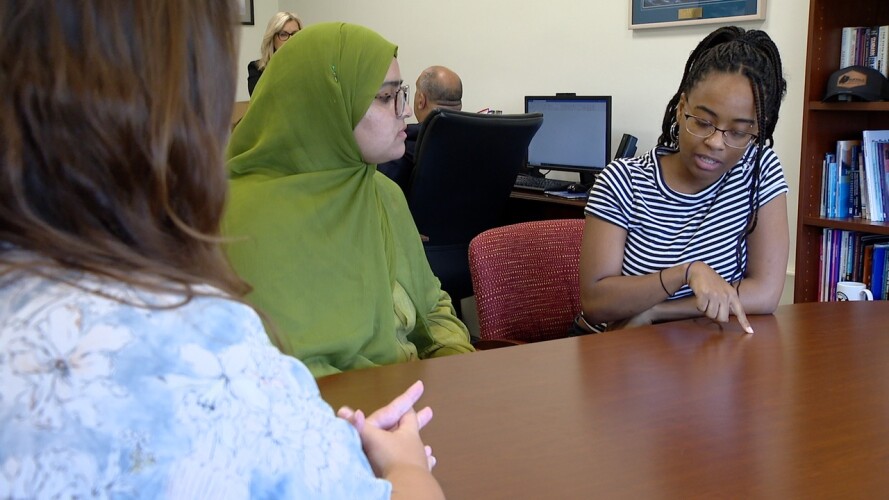NIAGARA FALLS, N.Y. (WKBW) — The mental health of students is a top priority in the Niagara Falls City School District.
As a new school year approaches, the district and the University at Buffalo are training a team of students on trauma-informed care.

I met with two students of the program, or Niagara Falls High School Champion Team, Julissa Hernandez and Khadeeja Tabbasam.
They're champions working to improve the mental health of all Falls students.
"We want to help the community," Julissa Hernandez said. "It's not just about the school."
"You learn to see that things that seem normal to you aren't normal to others, and then things that you may think are normal are trauma for others," Khadeeja Tabbasam said.

For the last three years, UB's Institute on Trauma and Trauma-Informed Care has trained teachers, staff and now students on how to recognize trauma.
"They are ears and eyes looking out for their peers to say, 'if you're having a problem, I can get you some help here, or have you thought about this?'" Mark Laurrie, Niagara Falls City Schools superintendent, said. "It's a world filled with a lot of trauma at this point."
Megan Koury, trainer with UB's Institute on Trauma and Informed Care, works with the students directly.
"We do go into depth about different types of trauma," she said. "Complex trauma, historical, racial, institutional trauma."
About 15 to 20 high school students make up the team. Tabbasam, who is Pakistani, tells me it's a diverse team of students.

"Trauma isn't just in one form. It's not like one thing. It's very diverse, and it's very different, depending on where it comes from," she said. "So, then you really get to see the outcome of it."
Both students were happy to learn the program. Hernandez even demonstrated the flip model.
"We try to prevent adversity from turning into trauma. That was a big point that we learned." Hernandez said. "Once you're having a shutdown reaction, your lid is flipped. People say things they don't tend to mean because they're not thinking with their sympathy, and they're not thinking with their actual brain. So, we say your lid is flipped, and you're not thinking with the top half of your head. You're not thinking logically."
WATCH: 'Want to help the community': Niagara Falls City School students learning to address trauma
Unfortunately, the program is in jeopardy due to major federal funding cuts, but Superintendent Laurrie is pledging to keep it going.
"It's too valuable not to continue, but it's disappointing that the funding source is not coming through," he said.
But some help has already arrived. The team appeared before the Buffalo Bills Foundation to show what they've learned about Trauma-Informed Care, which got the foundation's attention. They're providing a $10,000 grant.
"I'm proud that the Bills Foundation recognized the power of what we're doing for students," Laurrie stated. "We're grabbing a little bit of here, a little bit of there, a little bit of here, and we're going to make this work with local dollars and other grants that we have."

Koury tells me the school team has attended other community events and appeared before government agencies and leaders.
"We've got to go to the housing authority in Niagara Falls," Koury said. "We had a one-on-one conversation with the mayor in Niagara Falls, which was awesome."
"Trauma that people experience affects their futures and their lives and the lives of every person that they interact with," Tabbasam said. "Whether we may like it or not, it has a bigger outcome than we expect it to."




